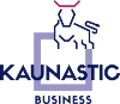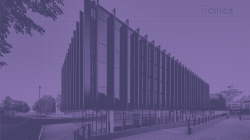The complex orthopedic solutions created in Kaunas successfully compete in the most demanding Western markets

Photo: A. Aleksandravičius.
Gediminas Kostkevičius, the head of Kaunas-based company Ortho Baltic, which develops individualized orthopedic solutions, says that among other things, a favorable tax environment for companies engaged in research and experimental development has helped to create and successfully expand activities in Lithuania. After receiving proposals to move to Ireland or Denmark and after a detailed analysis of the conditions, Kaunas residents were convinced that these countries are inferior to Lithuania in terms of tax benefits and support from the EU structural funds on the national level. “I say this responsibly – to Lithuanians who like to moan about these things,” G. Kostkevičius emphasizes. His company has been developing and manufacturing the most complex individualized orthopedic equipment for 19 years, which, in terms of its quality and innovations, is successfully competing in the most demanding Western markets.
Short story
The company was established by two founders in 2001: Otto Bock Scandinavia and Kaunas resident Gediminas Kostkevičius – an engineer and a mathematician, with a doctorate in technical sciences, and a master’s degree in law. The business idea of the newly established company Ortho Baltic was to manufacture personalized medical devices for customers around the world using innovative technologies. Thus began the development of extremely high-value, expensive products, the production and design of which, back in 2001, had not yet been automated and practically relied on manual labor. The shareholders’ paths diverged in 2005, when Otto Bock sold its shares to G. Kostkevičius, but the vision focused on innovation and individualized solutions remained one of Ortho Baltic’s key directions, currently, with a special focus on the use of new materials, the digitization of medical devices and the development of data engineering. “As far as I know, we are the only manufacturer of class III (the most complex) medical devices in the Baltic States, and we do not produce components but complete and EU-registered medical devices,” G. Kostkevičius, the head of the company, notes. Today, the products manufactured by Ortho Baltic are used for the treatment of rare and complex clinical conditions. They are also used for unique surgeries, for example, the restoration of 40 percent of the human skull using medical titanium and ceramics. We would be happy to demonstrate what we are capable of doing, but patients are not happy about posting images of what they looked like before and after surgery, therefore, we must respect their privacy, and would also like to wish people that they would never have to use our services.”
Innovative manufacturers of personalized medical devices
Currently, the company divides its activities into the dominant traditional ones (design and production of individual orthopedic technical devices) and the new ones (design and production of personalized joint replacements, orthopedic, maxillofacial and neurosurgical implants and disposable personalized surgical instruments using 3D printing technologies).
According to G. Kostkevičius, Ortho Baltic’s business model is unique in that it is based on production and data engineering symbiosis. “Together with the order to produce a patient-specific medical device, patient CT and MRI radiological images, 3D scans, other anatomical, clinical and treatment plan data are provided. We anonymize, parameterize, structure and store all of this data in a clinical database, using it to develop a variety of new products and technologies.”
For example, in 2019 Ortho Baltic has completed the development of a 3D preoperative planning system MICE (Medical Implants Customization Engine) with user access via web browser. With the help of this system, the surgeons not only perform preoperative planning but also order custom-made joint replacements or other reconstructive medical implants together with relevant clinical data and a surgical treatment plan. The manufacturer calls these technologies the long arms of the company, which help to reach potential customers and also provide them with tools that make their daily work easier.
The head of Ortho Baltic emphasizes that the company generally aims to digitize its medical devices (both portable and implantable) by installing wireless sensor systems in them. The sensors are used both to monitor the performance of the device and to transmit real time clinical readings that provide information about the patient’s condition. For example, one of the projects in this area is a portable multimodal sensor system and program for the registration and monitoring of epileptic seizures. The development of the program is based on machine learning using convolutional neural networks.
“In this way, we aim not only to make the medical device and sell it to a medical facility – where a surgeon will implant the device in the human body or a doctor will pass it on to the patient and, if all goes well, we will not receive any feedback from the end user – but also to maintain constant contact with the user of our products and provide them with a remote monitoring service,” G. Kostkevičius says.
Attracted and nurtured specialists
When asked why Orto Baltic was established specifically in Kaunas, G. Kostkevičius mentions that it was necessary to get qualified people from somewhere to start the business and Ortopedijos technika had quite a few of them.
“However, they were manufacturers, so we had to nurture researchers ourselves. Lithuanian universities did not train orthopedic engineers, only biomechanics. After a while, the bachelor of this specialty remained only at Vilnius Gediminas Technical University (VGTU). Nevertheless, we found talented students with whom we started working; sent them to study abroad,” the head of the company remembers the beginning.
Later, the team of researchers was supplemented by mechatronics specialists, physicists, materials scientists, electronics and IT specialists. Ortho Baltic currently employs 150 people, 15 percent of them are foreigners: Ph.Ds, researchers and qualified manufacturers. They had to be brought or invited because the company did not find suitable specialists in Lithuania or there were too few of them to meet the demand.
Important partnerships
All implantable, surgical medical devices and IT systems developed by Ortho Baltic were born in partnership. In R&D the company collaborates with Lithuanian University of Health Sciences (LSMU), Kaunas University of Technology (KTU), Vilnius University (VU), VGTU, business partners in Lithuania and abroad, with Latvian, Austrian, German, Spanish, Australian, Israeli, Belgian and Canadian universities, research centers, university hospitals, businesses and experts.
“We develop innovative products. Lithuania does not have all the competencies we need, and it is not easy to find them abroad as well. We follow scientific publications when we discover the ones that interest us, we try to contact their authors or we hire a technology scout company to help find partners with competencies in the field that interests us,” the head of the company explains.
It is not about the price but about the quality
Virtually all Ortho Baltic’s products go abroad, only one percent remains in Lithuania. The main markets are Benelux, Scandinavia, Germany, Switzerland and Austria, which account for more than 94 percent of company’s export. When asked what led to the its successful expansion into the most demanding markets in Western Europe and other countries with this brand, the interviewee emphasizes that Ortho Baltic, first and foremost, focuses on quality rather than price and has been profitable for all 19 years of operation. “I would stress having a clear business development strategy, the company’s ability to successfully compete for structural funds for the implementation of R&D projects and development of the R&D base not only in Lithuania but also on a European level, the ability to find suitable science and technology partners (not only in Lithuania but also abroad), as well as a favorable tax environment for research and experimental development companies. I say this responsibly – to Lithuanians who like to moan about these things. We were invited to move the management and R&D department of our company to Ireland or Denmark, so we had to take a closer look at them, and I can say that although these countries have their advantages, tax benefits and support from the EU structural funds on a national level are superior Lithuania, not to mention that that everything we have achieved in Lithuania would have had a significantly higher cost there.”
Information by “Kaunas IN” Business Division.




